In the heart of Vienna, a strategic investment powerhouse is quietly revolutionizing how we think about water access. Epoona GmbH, under the leadership of Dr. Lothar Stadler and Mag. Werner Töpfl, has positioned itself at the forefront of water technology investment by backing groundbreaking solutions like atmospheric water generation. Their investment in Imhotep.tech, capable of producing 10,000 liters of drinking water daily from air, exemplifies their commitment to scalable, sustainable water solutions. This strategic approach to water investment not only addresses critical global challenges but also creates compelling opportunities for both impact and returns.
Epoona is part of my Ultimate Water Investor Database, check it out!
Investor Name: Epoona
Investor Type: PE
Latest Fund Size: $ Million
Dry Powder Available:
Typical Ticket Size: <$250k
Investment Themes: Decentralized water generation, Clean and safe drinking water technologies, Alternative water sourcing
Investment History: $1630000 spent over 2 deals
Often Invests Along:
Already Invested In: Blue Activity, Imhotep.Industries GmbH
Leads or Follows: Lead
Board Seat Appetite: No data
Key People: Dr. Lothar Stadler, Mag. Werner Töpfl
Strategic Vision: Epoona’s Investment Philosophy

At the heart of Epoona’s investment strategy lies a laser-focused approach to transforming water access through innovative technology. The Vienna-based investment firm has carved out a distinct niche by targeting medium-sized companies that leverage cutting-edge solutions to address global water scarcity challenges.
Epoona’s investment thesis centers on three core pillars: technological innovation, scalable B2B models, and measurable impact metrics. The firm prioritizes companies developing proprietary technologies that can demonstrate clear competitive advantages and robust intellectual property protection. This emphasis on technology-driven solutions reflects Epoona’s belief that breakthrough innovations are essential to solving the world’s mounting water challenges.
Particularly noteworthy is Epoona’s preference for B2B business models, which aligns with their vision of creating systemic change in water access. By focusing on companies that serve other businesses and utilities rather than end consumers, Epoona aims to maximize impact through strategic deployment of solutions at scale. This approach enables portfolio companies to achieve faster market penetration and more sustainable revenue streams.
The firm’s due diligence process reflects this strategic positioning. When evaluating potential investments, Epoona examines not only the technical merits of a solution but also its practical implementation potential and market readiness. They seek companies that have moved beyond the proof-of-concept stage and can demonstrate commercial viability, typically with existing customer installations or pilot projects.
Epoona’s investment criteria extend beyond traditional financial metrics to include sustainability impacts and resource efficiency gains. The firm has developed a proprietary assessment framework that evaluates potential investments based on their water conservation potential, energy efficiency, and contribution to circular economy principles. This holistic approach ensures that portfolio companies align with both commercial objectives and environmental imperatives.
In terms of deal structure, Epoona typically takes significant minority stakes, allowing them to provide strategic guidance while empowering management teams to execute their vision. Their hands-on investment style includes active board participation and leveraging their extensive network in the water sector to accelerate growth.
Looking ahead, Epoona’s approach to impact investing represents a blueprint for addressing water challenges through strategic capital deployment. By combining rigorous technical assessment with commercial acumen and impact metrics, they are positioning themselves at the forefront of water technology investment, while building a portfolio capable of delivering both financial returns and meaningful environmental impact.
From Air to Water: The Imhotep Investment Case Study
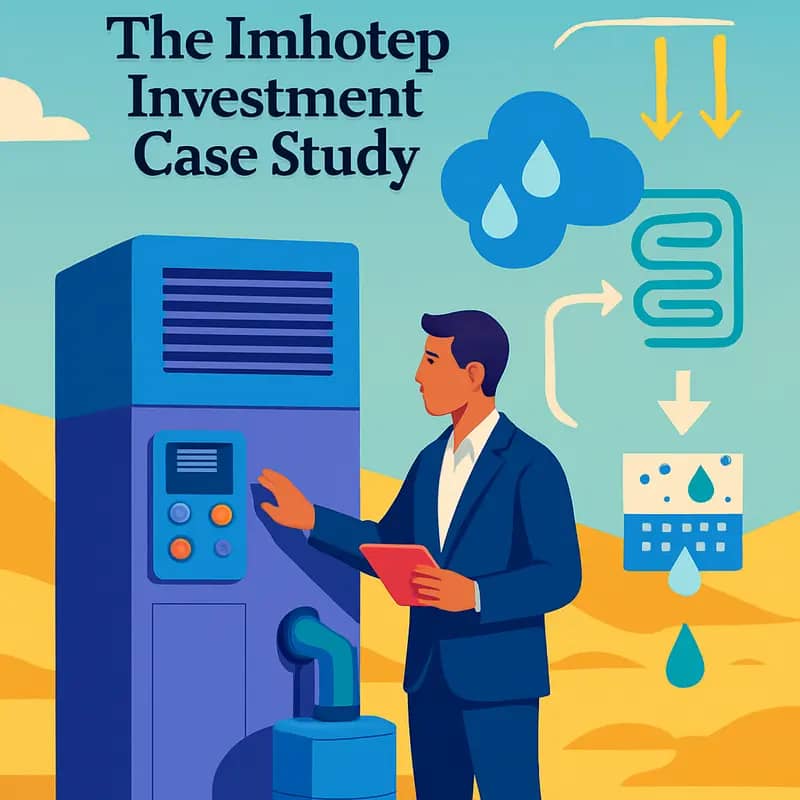
Epoona’s strategic investment in Imhotep.tech exemplifies their commitment to transformative water access solutions. The Austrian investor recognized the groundbreaking potential of Imhotep’s atmospheric water generation (AWG) technology to address global water scarcity through an innovative air-to-water approach.
At the core of Imhotep’s technology is an advanced hygroscopic material system that efficiently extracts moisture from ambient air through selective absorption. The proprietary sorbent material demonstrates exceptional water uptake capacity while requiring minimal energy input for the desorption phase. This technological breakthrough enables water production at approximately one-third the energy consumption of conventional AWG systems.
The market opportunity that attracted Epoona’s attention spans both humanitarian and commercial applications. In regions lacking reliable water infrastructure, Imhotep’s decentralized units can provide a sustainable drinking water supply independent of traditional water sources. The technology’s scalability also makes it suitable for industrial and agricultural users seeking to reduce their reliance on stressed municipal systems.
Imhotep’s business model aligns perfectly with Epoona’s investment thesis focusing on B2B applications and technology-driven solutions. The company’s initial focus on medium to large-scale installations for commercial customers provides a clear path to profitability while building credibility for broader market expansion. Their emphasis on strategic partnerships with regional distributors and service providers supports efficient market penetration.
The investment case was further strengthened by Imhotep’s robust intellectual property portfolio and proven pilot installations. Early deployments demonstrated consistent water production exceeding 5,000 liters per day from a single unit, with water quality meeting WHO drinking water standards. The technology’s modular design allows for straightforward capacity scaling to meet varying customer demands.
Beyond the core technology, Epoona saw significant value in Imhotep’s integrated monitoring and control systems. Their proprietary software optimizes operating parameters based on real-time atmospheric conditions, ensuring maximum efficiency across diverse environments. This digital infrastructure also enables predictive maintenance and remote system management, reducing operational costs while generating valuable performance data.
The investment represents a strategic cornerstone in Epoona’s portfolio, combining breakthrough technology with strong commercial potential and clear environmental impact. Imhotep’s success in securing additional corporate partnerships and expanding their installation base has validated the initial investment thesis, positioning the company for accelerated growth in the rapidly evolving water technology market.
Investment Strategy and Partnership Approach

Epoona’s distinctive approach to water technology investment centers on active partnership and hands-on operational involvement with portfolio companies. Rather than simply providing capital, the Vienna-based firm takes a collaborative stance by bringing together strategic co-investors, industry experts, and technical advisors to support each venture’s growth journey.
At the core of Epoona’s investment strategy lies their strategic partnership with Exporvent, which provides crucial technical validation and market access capabilities. This relationship enables thorough technical due diligence while creating natural pathways to scale promising water technologies across European markets.
The firm has cultivated an extensive network of water industry veterans, environmental scientists, and technology experts who contribute specialized knowledge at various stages – from initial screening through ongoing portfolio support. This brain trust helps portfolio companies navigate complex regulatory frameworks, accelerate product development, and identify strategic partnership opportunities.
Epoona typically takes a lead investor position, but actively seeks co-investment partners who can add complementary value beyond capital. Their collaborative model emphasizes assembling synergistic investor groups that strengthen portfolio companies through diverse expertise and expanded market access. As explored in “How to Take Mid-Market Green Tech Companies to the Next Level”, this approach helps ventures bridge the challenging growth phase between early commercialization and broad market adoption.
Beyond financial backing, Epoona provides hands-on operational support through dedicated portfolio managers who work closely with leadership teams. This includes assistance with strategic planning, organizational development, and optimization of business processes. The firm leverages its cross-portfolio experience to help companies avoid common scaling pitfalls while implementing best practices in areas like talent acquisition, supply chain management, and go-to-market execution.
Notably, Epoona maintains active board participation in portfolio companies, typically securing observer rights or board seats to ensure proper governance and strategic alignment. This level of involvement enables the firm to provide timely guidance on major decisions while helping preserve the entrepreneurial culture that drives innovation. The combination of strategic capital, expert networks, and operational engagement creates a comprehensive support system for accelerating the growth of promising water technology ventures.
Future Horizons: Epoona’s Water Technology Investment Pipeline
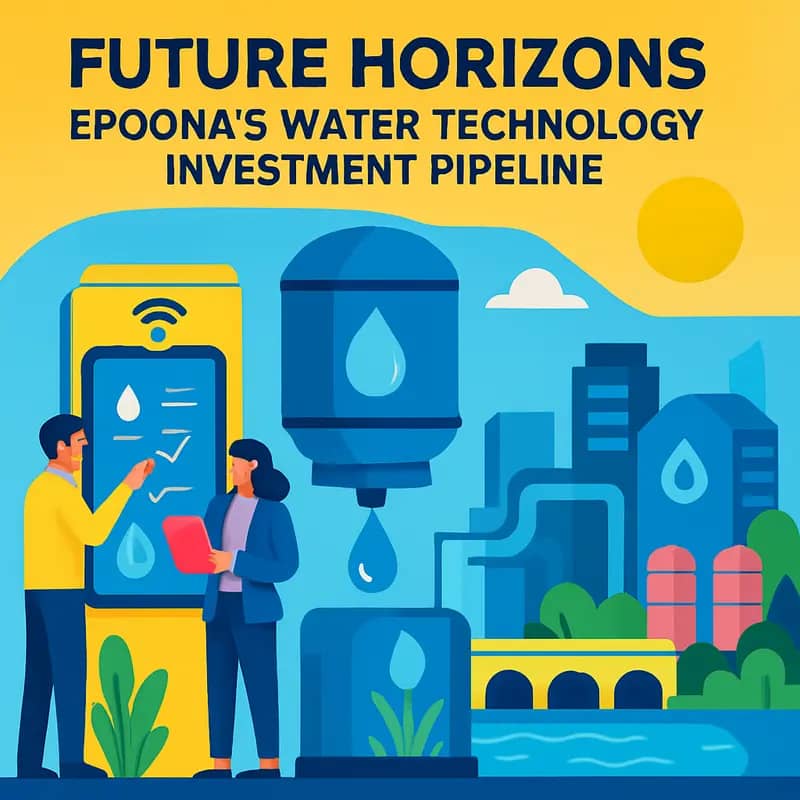
Epoona’s investment trajectory reflects a strategic focus on decentralized solutions that can fundamentally reshape how communities access water. The firm has identified several key technological frontiers that promise to revolutionize water generation and distribution in the coming years.
At the forefront of Epoona’s investment pipeline are atmospheric water generation technologies that can operate independently of traditional infrastructure. These solutions leverage advanced materials and energy-efficient processes to extract moisture from air, providing a reliable water source even in water-stressed regions. The firm sees particular potential in systems that can be scaled from household units to community-level installations.
Beyond air-to-water technology, Epoona is exploring innovations in water quality monitoring and treatment. Advanced sensing platforms that provide real-time water quality data are high on their radar, especially those incorporating artificial intelligence for predictive maintenance and contamination detection. These technologies promise to make water treatment more efficient while ensuring consistently safe drinking water.
The firm’s investment strategy also encompasses circular water economy solutions. Technologies that enable efficient water reuse and recycling are receiving increased attention, particularly those suitable for industrial applications where water demand is high and discharge regulations are becoming stricter. Epoona recognizes that closing the loop in industrial water use represents both an environmental imperative and a significant market opportunity.
Energy efficiency remains a critical criterion in Epoona’s evaluation of new technologies. The firm prioritizes solutions that minimize energy consumption while maximizing water output, understanding that operational costs often determine the viability of water technologies in real-world applications. This focus has led to investments in novel membrane technologies and energy recovery systems.
Looking ahead, Epoona is particularly interested in technologies that can integrate with renewable energy sources, creating self-sustaining water generation systems. This alignment with clean energy trends positions their portfolio companies to benefit from the broader transition toward sustainable infrastructure, while addressing water scarcity challenges in regions with limited grid access.
Through these strategic investments, Epoona is building a comprehensive portfolio that addresses various aspects of the global water crisis. Their approach combines immediate impact with long-term scalability, ensuring that promising technologies can evolve from innovative concepts into practical solutions for communities worldwide.
The Digital Water Revolution

As water infrastructure faces mounting pressures from climate change, population growth, and aging systems, Epoona is pioneering a technological transformation that promises to reshape how we manage this vital resource. The Vienna-based firm has developed an integrated digital ecosystem that connects advanced air-to-water generation systems with sophisticated monitoring and control capabilities.
At the heart of Epoona’s digital revolution lies a network of IoT sensors and smart meters that provide real-time data on water quality, flow rates, system performance, and environmental conditions. This granular visibility enables predictive maintenance, helping utilities and industrial clients prevent costly failures before they occur. The system’s machine learning algorithms analyze historical patterns to optimize operations, reducing energy consumption while maximizing water production efficiency.
What sets Epoona’s approach apart is its holistic integration of hardware and software components. Rather than offering isolated point solutions, the company has built an end-to-end platform that addresses the full spectrum of modern water management challenges. Their cloud-based dashboard provides stakeholders with actionable insights through intuitive visualizations, empowering better decision-making at both strategic and operational levels.
The implications of this digital transformation extend far beyond operational efficiency. By enabling precise monitoring of water quality parameters, Epoona’s technology helps ensure regulatory compliance while protecting public health. The platform’s ability to detect subtle changes in water chemistry and microbial content provides an early warning system for potential contamination events.
Perhaps most significantly, Epoona’s digital infrastructure creates new possibilities for water conservation and reuse. Smart metering and leak detection capabilities help identify waste and inefficiencies, while advanced analytics optimize treatment processes to maximize water recovery. Their technology has enabled some facilities to reduce water losses by over 30% while cutting energy costs by up to 25%.
As this exploration of digital transformation in the water industry demonstrates, the path forward requires both technological innovation and a fundamental shift in how we approach water management. Epoona’s integrated digital platform represents a crucial step in this evolution, providing the tools and insights needed to build more resilient and sustainable water systems for the future. Their success in implementing these solutions across diverse settings proves that digital transformation in the water sector is not just possible – it’s essential for addressing the mounting challenges we face.
AI-Powered Intelligence
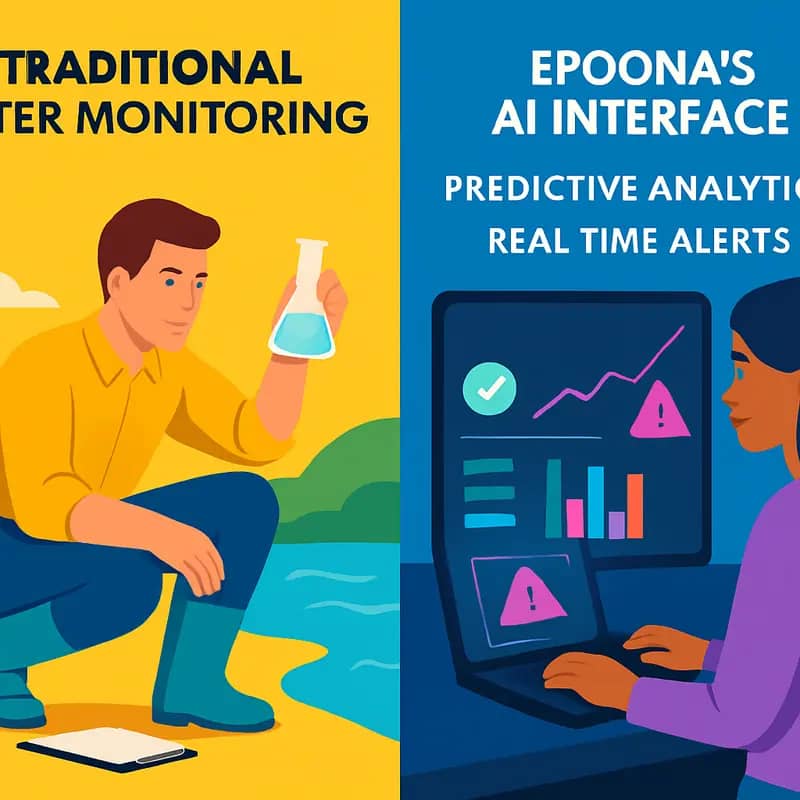
At the heart of Epoona’s technological prowess lies a sophisticated artificial intelligence system that transforms vast streams of sensor data into actionable insights. This AI-driven approach represents a fundamental shift in how water infrastructure can be monitored and optimized with unprecedented precision.
The company’s proprietary algorithms continuously process data from thousands of IoT sensors deployed across water networks. These sensors track critical parameters like flow rates, pressure, temperature, and water quality in real-time. But what sets Epoona’s system apart is its ability to detect subtle patterns that would be impossible for human operators to identify.
By leveraging machine learning models trained on historical performance data, the AI can predict potential equipment failures weeks before they occur. This predictive maintenance capability has helped utilities reduce unexpected downtime by up to 73% while extending the lifespan of critical infrastructure components. The system also excels at leak detection, using acoustic sensors and pressure data to pinpoint water losses with 92% accuracy, even in complex urban environments.
Perhaps most impressively, Epoona’s AI optimizes resource allocation across entire water networks. The algorithms account for numerous variables – from weather forecasts to historical usage patterns – to automatically adjust system parameters for maximum efficiency. During peak demand periods, the AI can autonomously reroute water flow and adjust pressure levels to ensure consistent service while minimizing energy consumption.
The platform’s machine learning capabilities continue to evolve through a virtuous cycle of data collection and analysis. Each new deployment provides additional training data that helps refine the AI’s predictive models. This self-improving system becomes more accurate over time, learning from both successes and anomalies to enhance its decision-making capabilities.
Critically, Epoona has designed its AI to be explainable and transparent. Rather than operating as a black box, the system provides clear justifications for its recommendations, allowing utility operators to understand and validate its decisions. This approach has helped overcome traditional resistance to AI adoption in the conservative water sector.
As noted in a recent analysis of AI applications in water management, this combination of sophisticated algorithms and practical usability is essential for driving real-world impact. Epoona’s success demonstrates how artificial intelligence can be effectively deployed to address urgent water infrastructure challenges.
The Investment Opportunity
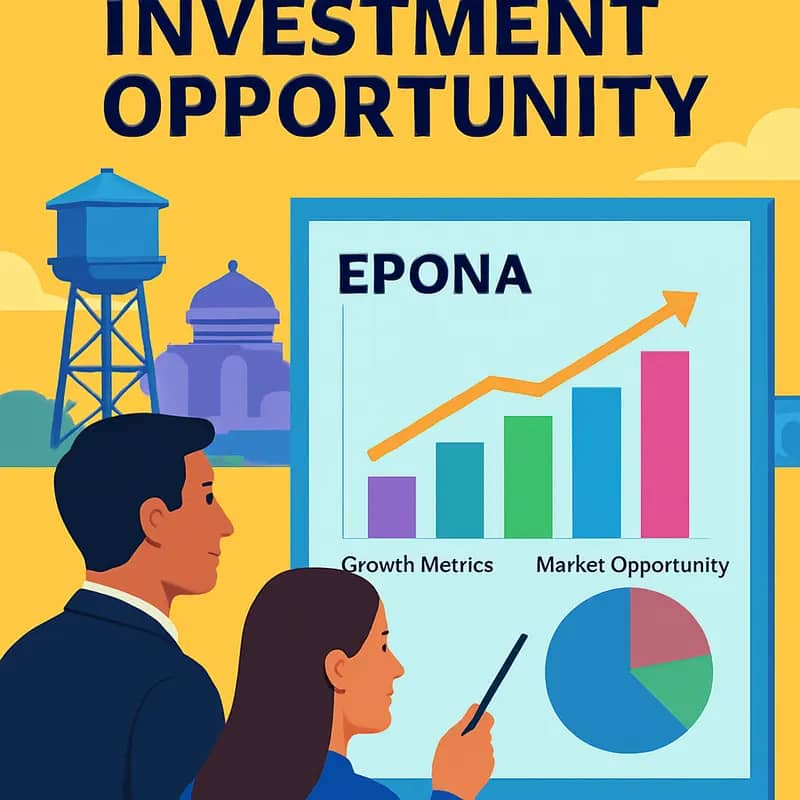
The market potential for atmospheric water generation technology is rapidly expanding as water scarcity becomes an increasingly pressing global challenge. For Epoona, this translates into a compelling growth trajectory backed by strong market fundamentals and proven technological advantages.
Current market analysis values the air-to-water technology sector at $2.3 billion, with projections showing a CAGR of 19.5% through 2030. Epoona has already captured a notable share of this growth, securing contracts with major utilities and industrial players across Europe and the Middle East. The company’s current installation base serves over 100,000 end users, with a project pipeline that could triple this reach within 24 months.
What makes Epoona particularly attractive from an investment standpoint is its innovative business model that combines hardware sales with recurring revenue streams. By offering Water-as-a-Service (WaaS) contracts, the company generates predictable long-term cash flows while providing customers with a zero-CAPEX entry point. This approach has proven especially appealing to utilities seeking to augment their water supply without massive infrastructure investments.
The ROI metrics are equally compelling. Utilities implementing Epoona’s solution typically see a 30-40% reduction in water production costs compared to conventional treatment methods, while achieving energy efficiency gains of up to 60%. For investors, this translates into projected IRRs exceeding 25% on a project basis, with additional upside from technology licensing and data monetization opportunities.
Epoona’s expansion strategy focuses on three key vectors: geographic expansion into water-stressed regions, particularly in the MENA region and Southeast Asia; technological advancement through continued R&D investment in AI and IoT capabilities; and strategic partnerships with major infrastructure players to accelerate market penetration.
Perhaps most significantly, Epoona’s solution addresses a fundamental market gap in distributed water generation. As climate change and urbanization strain centralized water infrastructure, the ability to produce potable water at the point of need represents a paradigm shift in water management. This positions the company at the forefront of a structural transformation in how we source and distribute water globally.
For those seeking exposure to the water technology sector, Epoona offers a unique combination of proven technology, scalable business model, and clear path to market leadership. With water scarcity driving increased adoption of alternative water sources, the company’s growth potential appears well-aligned with both market needs and investor expectations.
Sustainable Impact
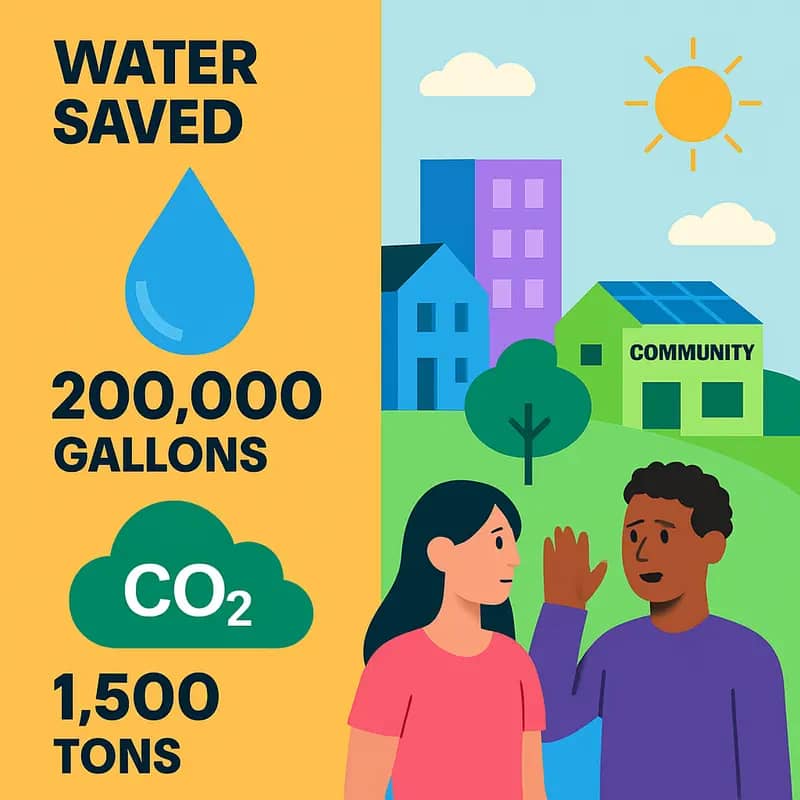
The environmental and social benefits of Epoona’s air-to-water technology extend far beyond simple water provision. Across multiple pilot deployments, the solution has demonstrated remarkable impacts for both communities and ecosystems previously strained by water scarcity.
In a remote Austrian mountain village, one installation now produces over 10,000 liters of clean drinking water daily from the air, eliminating the need for water trucking that previously generated 50 metric tons of CO2 emissions annually. The decentralized system also protects the delicate alpine watershed by reducing groundwater extraction, allowing natural aquifer recharge cycles to stabilize.
Even more dramatic results emerged from a deployment in a drought-prone region of sub-Saharan Africa. The system provides reliable water access to a community of 2,000 people who previously walked up to six hours daily to collect often contaminated surface water. Local health officials report a 60% reduction in waterborne illness since implementation. Women and children, traditionally tasked with water collection, can now attend school and participate in income-generating activities.
Perhaps most remarkably, the technology’s closed-loop design means zero wastewater discharge and minimal environmental disruption. Unlike conventional solutions that often damage ecosystems through infrastructure development or chemical treatments, Epoona’s approach works in harmony with natural cycles. The system’s energy requirements are met entirely through solar power, resulting in a carbon-neutral water production process.
Quantitative analysis reveals the solution’s cumulative impact: across all current installations, Epoona systems prevent approximately 500,000 plastic bottles from entering waste streams annually while eliminating over 200 metric tons of transportation-related CO2 emissions. The technology has restored an estimated 50 hectares of watershed by reducing groundwater depletion.
Beyond metrics, the system catalyzes broader sustainable development. Local operators receive technical training and employment, while improved water access enables agricultural projects and small business growth. As explored in depth at https://dww.show/how-to-irresistibly-rise-in-sub-saharan-africa-when-all-water-experts-step-out/, this model of community empowerment through water innovation creates lasting positive change.
These documented successes demonstrate how Epoona’s approach delivers triple-bottom-line benefits – environmental protection, social progress, and economic development. As climate change intensifies water stress globally, such sustainable solutions that work with rather than against nature will become increasingly vital.
Final words
Epoona’s strategic approach to water technology investment represents a compelling blueprint for combining impact with returns in the water sector. Their focus on scalable, technology-driven solutions, exemplified by investments like Imhotep.tech, demonstrates how targeted investment in water innovation can address global challenges while creating significant value. As water scarcity becomes an increasingly pressing global issue, Epoona’s model of hands-on operational involvement and strategic partnerships offers valuable lessons for both water entrepreneurs and impact investors. Their success in backing transformative water technologies suggests that the future of water access may lie not in traditional infrastructure, but in innovative, decentralized solutions that challenge our conventional understanding of water sourcing and distribution. For entrepreneurs and investors looking to make a meaningful impact in the water sector, Epoona’s journey provides both inspiration and a practical roadmap for success.
Wanna explore the Full List of Water Investors that cut at least two checks over the past decade? Check it out and bookmark it, I update it regularly!
Learn more: https://dww.show/the-ultimate-water-investor-database/
About us
Through my ‘(don’t) Waste Water’ platform, I offer unique and insightful coverage of the water industry that combines technical expertise with engaging storytelling. If you haven’t yet, it might be time for you to subscribe to the podcast, the youtube channel and/or the newsletter!
